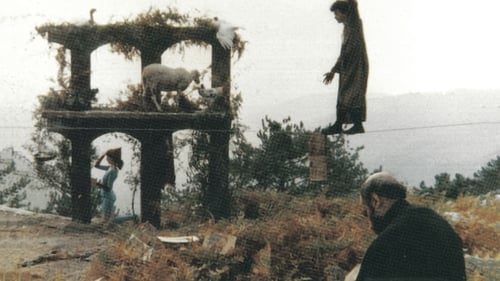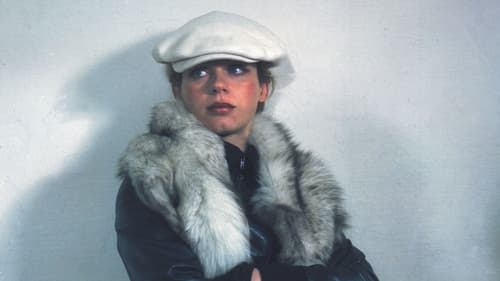
Director of Photography
A documentary essay on the 1960s women's liberation movement in Germany and it's developments and conflicts through the following decades.

Camera Supervisor

Camera Operator

Camera Operator
At the Vienna Art Academy in 1994, an unidentified person painted over 27 works by Austrian painter Arnulf Rainer. Rainer had become world-famous for his abstract art and, in particular, for his over-layering of photographs and overpainting of his own and other artists’ works. But who painted over the “overpainter”? Speculation rages: Did he attack his works himself? A year later, an unsigned letter surfaces claiming responsibility for the act directed against Rainer – and modern art in general – and accusing the artist of being complicit with “destructive modernism.” At the same time, Austria is shaken by a series of mail bombs by the Bajuwarian Liberation Army, in response to the supposed threat to Austria’s “German identity.” Are there connections between the overpainting event and the mail bombs? Or is this all just a game? A dream? Or perhaps a hallucination?

Director of Photography
The movie tells a true story in the life of well-known German actor Manfred Krug. Living in the German Democratic Republic he is forced to leave the country after protesting against the expatriation of singer/songwriter Wolf Biermann in 1976.

Director of Photography

Camera Operator
Dammbeck, himself an alumnus of the Leipzig Academy for Graphic and Book Design, presents the origins of the new German realism developed by the so-called Leipzig School, which took place in the context of socialist-realist dogma in the GDR before the Wall was built in 1961. After the Wall came down in 1989, what happened to the major Leipzig School painters Werner Tübke and Bernhard Heisig, who had been called “Dürer’s red heirs” by West German journalists in the 1970s? In the film, Tübke, Heisig, and former GDR officials who were involved with the cultural scene in Leipzig at the time talk about modernism, conformism, political pressure, party discipline, personal claims, and fading memory. The documentary paints an insightful, often critical picture of early East German art history.

Director of Photography
A group of young people draws straws to see who'll steal some cigarettes. With this theft, Sebastian starts a bizarre, symbolic odyssey through a sclerotic world, in search of himself and of truth and justice. When he tries withdrawing from one social paradigm, he finds himself caught in another.

Camera Operator
The film explores what transformations in power and politics do to art, how much opportunism can be found in “pure” art and whether fascist symbols can ever regain their aesthetic innocence. The questions it addresses about the relationship between ethics and aesthetics make a valuable contribution to any discussion about art and power.

Camera Operator
Despite seeing his film project HERCULES rejected by DEFA Studios in 1983-84, Dammbeck remained fascinated by the Hercules story. He started experimenting with different media combinations, using overpainting, photography, film clips, collage, painting, and movement. These experiments resulted in groundbreaking multimedia collaborations, as well as the film THE CAVE OF HERCULES, in which Dammbeck explores a series of questions inspired by this classical figure. Who was the legendary hero Hercules? Is there a new Hercules today? How are heroes created in a totalitarian society? What are the virtues of heroes? This multi-layered experimental film combines projections of collected film clips, quotations from “The Willful Child” by the Brothers Grimm, and “Hercules 2 or the Hydra” by Heiner Müller, as well as dance scenes with Eva Schmale that were performed – at Kampnagel in Hamburg – specifically for the film.

Director of Photography
The film is dedicated to the Armenian monk and genius composer Komitas, and the 2 million victims on his people in Turkey in 1915. The final 20 years of Komitas life were spent in various mental hospitals. The destiny of Komitas? This is the magic beauty of Armenian culture and the abhorrent brutality of Armenian history. A cultural and artistic world that was slaughtered with a curved knife. A humanity that doggedly advances towards an apocalyptic catastrophe, that does not recognize its own original purpose, eradicates its own memory, its final roots.

Camera Operator
In this film, Dammbeck explores his own decision to relocate to Hamburg, West Germany, and tries to sort out his past as an artist. In the process, he interviews artists Cornelia Schleime, Hans-Hendrik Grimmling, and Hans Scheib, who had been core members of the alternative art scene in East Germany. They had all worked together in the 8mm scene and organized or planned multimedia and crossover exhibitions, including Tangents I in 1976-77 and the First Leipzig Autumn Salon in 1984. Each left for West Germany in the mid-1980s. What has become of their former artistic strategies and positions? How do they deal with their past? What is the force behind their art now? And how do they cope with the western art market?

Director of Photography
Extensive dialogue and the tight focus of a single apartment setting marks this romantic and politically symbolic drama about Malgorzata, a Polish photographer (Krystyna Janda) and her married French lover Paul (Sami Frey). The two rendezvous in West Berlin to spend some time together before Malgorzata has to go back to Warsaw and Paul returns to his wife and daughter.

Cinematography
A group of aging friends, foes, and former colleagues gather to celebrate and deride the life of 80-year-old actress Francesca on her birthday.

Director of Photography
The 2nd of three self-contained shorts by Helke Sander from her series of shorts entitled From the Reports of Security Guards & Patrol Services.

Director of Photography
Twelve-year-old Isabel and her mother, who was a famous political singer, had to escape Chile after the 1973 military coup. Isabel’s father stayed behind fighting in the underground. For six years, they have lived in a new apartment building in East Berlin. At first, the neighbors made an effort to welcome them, but later became more distant. Isabel does not feel at home in the strange country. Not even her friendship to Philip, the neighbors’ son, can change her mind. Almost every day, Isabel sits on the stairs waiting for a letter from her father, from whom she has not heard for many years.

Director of Photography
Some villages are torn down because of open cast mining south of Leipzig. The landscape changes and so do the lives of the people. The four years chronicle - an allegory of the loss of homeland, the destruction of nature in the name of progress and prosperity. Sadness and melancholy remain. Environmental protection, one of the difficult issues in the GDR.

Director of Photography
In the fall of 1945, nineteen year-old Mark Niebuhr, is accused of murder and is jailed as a prisoner of war in Warsaw, Poland. He maintains his claim of innocence throughout long periods of solitary confinement. When Mark is placed among a group of Polish criminals, he becomes the target of their aggression. Later, Mark experiences true hell in a communal cell with fanatical German war criminals. Turning Point is based on actual events from Hermann Kant's novel of the same name.

Director of Photography
"Busch singt" consists of 6 films "About the first part of our century" and does not present Ernst Busch only as a singer but is a film with and about Busch as a chronicler and fighter for communist ideals of his time. Konrad Wolf died during the production, he directed part 3 "1935 oder Das Faß der Pandora" and part 5 "Ein Toter auf Urlaub".

Director of Photography
Sunny is the singer of band trying to establish itself in the music-scene of East-Berlin. They play regular gigs in small towns, but Sunny feels out of touch with the audience and her life as a whole. She begins a relationship with the amateur saxophonist and studied philosopher Ralph who writes her a very personal song - but his obsession with death and unfaithful lifestyle is not for her. After getting into a quarrel with a band member who harasses her and telling off a show-host she is thrown out of the band. Abandoned, she struggles to regain control over her life.

Director of Photography
Impressions from the wedding of two young Chileans in the German Democratic Republic.

Cinematography
The film looks at the problems of high school students in an 11th grade class in Berlin-Prenzlauer Berg. The focus is on interpersonal relationships. The school, the circle of friends, the parental home, the social milieu, the housing situation and leisure activities form the environment in which the young people find themselves on the threshold to adulthood. The film explores their wishes, thoughts, fears, dreams, hopes and conflicts. Opportunities and offers that go beyond school and can be helpful in resolving problems are also shown. It is up to the viewer to weigh up the different views of the interviewees and form their own opinion.

Director of Photography


















